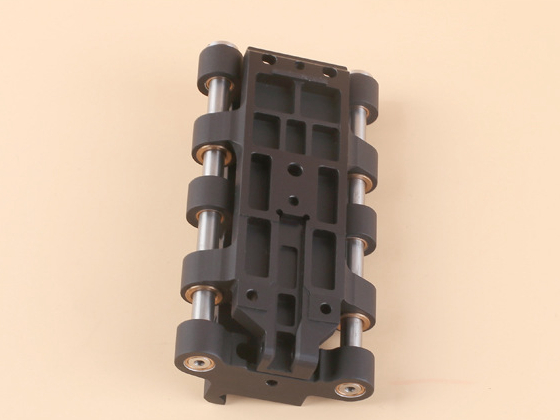Engineering Plastic PEEK CNC Machining for Precision Prototypes in Automation
Introduction
In the rapidly advancing automation industry, creating high-performance prototypes swiftly and accurately is crucial. Polyether Ether Ketone (PEEK), a high-performance engineering plastic, has become increasingly popular for precision prototypes due to its exceptional mechanical strength, thermal stability, and chemical resistance. This case study examines our specialized CNC machining services for PEEK, highlighting the manufacturing processes, material characteristics, surface treatments, industry applications, and the advantages and limitations of using this versatile material.
Manufacturing Process
Our precision CNC machining capabilities for engineering plastic PEEK involve advanced techniques, including:
CNC Milling: Produces intricate geometries and precision features ideal for prototype development.
CNC Turning: Enables precision manufacturing of symmetrical and cylindrical PEEK components.
CNC Drilling: Provides accurate hole positioning and sizes, essential for automated system assembly.
Multi-Axis CNC Machining: Delivers exceptional precision for complex, multidimensional prototypes.
These specialized CNC processes ensure the production of high-quality, reliable, and functional prototypes tailored for automation applications.
Material: Polyether Ether Ketone (PEEK)
PEEK is a high-performance thermoplastic renowned for:
Outstanding thermal stability up to 260°C (500°F).
Excellent chemical and moisture resistance.
High mechanical strength and stiffness.
Superior dimensional stability and low thermal expansion.
These attributes make PEEK highly suitable for precision automation prototypes requiring durability, high performance, and chemical resistance.
Compared to traditional materials such as Aluminum 6061-T6 or Stainless Steel SUS316, PEEK provides significant weight savings and greater chemical resistance, enhancing the efficiency and performance of automation components.
Surface Treatments for Optimal Performance
Although PEEK naturally exhibits superior surface quality, specific treatments enhance its performance further:
Vapor Polishing: Enhances surface smoothness for applications requiring minimal friction.
Teflon Coating: Specialty coatings improve wear resistance, reduce friction, and enhance chemical resistance.
Annealing: Reduces internal stresses and stabilizes dimensions for high-precision applications.
Selecting the right surface treatment ensures the PEEK prototypes meet specific automation application requirements. For instance, applications exposed to aggressive environments may benefit significantly from a powder coating or advanced polishing processes.
Industry Application
Engineering plastic PEEK CNC machined prototypes are crucial in various automation industry applications, including:
Robotics Components: Parts requiring precise tolerances, lightweight strength, and resistance to chemical exposure.
Automated Manufacturing Systems: High-performance fixtures, grippers, and other critical components.
Sensor Housing: Protective casings resistant to harsh environmental conditions.
Precision Bearings and Bushings: Reducing friction and wear in automated machinery.
Automation engineers depend on PEEK prototypes to test, validate, and refine complex systems quickly and accurately. For instance, using PEEK rather than traditional metallic materials like carbon steel significantly reduces the component weight, thereby enhancing the efficiency and performance of automated robotic arms and assemblies.
Advantages and Limitations
Advantages:
High strength-to-weight ratio: Essential for lightweight automation components.
Chemical and thermal resistance: Suitable for diverse, harsh environmental conditions.
Superior dimensional stability: Ideal for precision manufacturing.
Durability and wear resistance: Reduces maintenance and prolongs service life.
PEEK surpasses many common engineering plastics, such as ABS and Delrin (Acetal Homopolymer), in terms of thermal and chemical resistance, significantly enhancing reliability and performance in automation systems.
Limitations:
Higher material cost: More expensive compared to standard engineering plastics like polypropylene (PP).
Specialized machining knowledge required: Demands precise CNC machining expertise.
Limited color options: Could impact aesthetic applications.
Despite these limitations, PEEK remains a highly preferred material in high-performance automation prototyping due to its exceptional properties, outperforming other plastics and even metals such as brass in specific scenarios.
FAQs
Why is PEEK ideal for precision prototypes in automation?
PEEK offers outstanding mechanical strength, thermal stability, and chemical resistance, ideal for demanding automation environments.
What CNC machining processes are best suited for PEEK components?
CNC milling, turning, drilling, and multi-axis machining are ideal for achieving high-precision, complex geometries required in automation.
Which surface treatments enhance the performance of PEEK prototypes?
Vapor polishing, Teflon coating, and annealing significantly enhance the surface properties of PEEK components.
What are the key considerations when CNC machining PEEK?
Managing heat, tool selection, machining speed, and feed rates are critical factors influencing the machining quality of PEEK.
How does PEEK compare to other engineering plastics in automation?
PEEK offers superior thermal and chemical resistance, greater dimensional stability, and higher mechanical strength than standard plastics.

